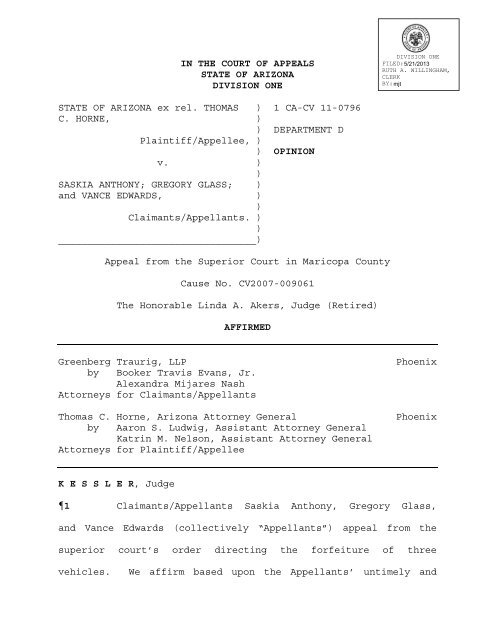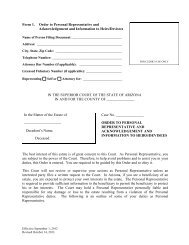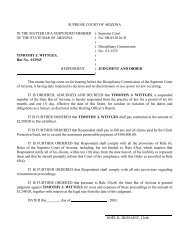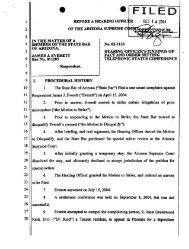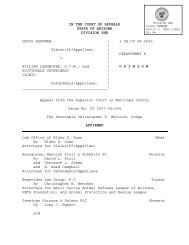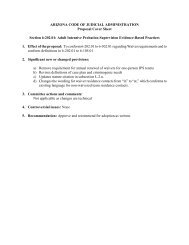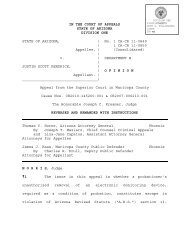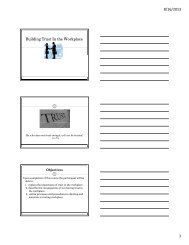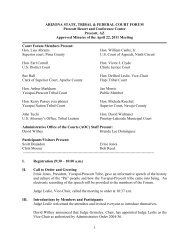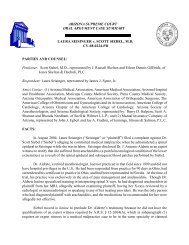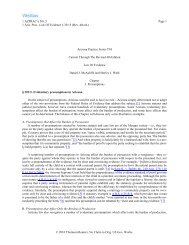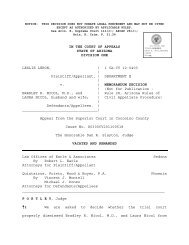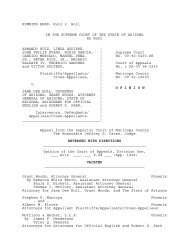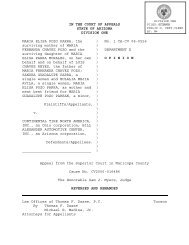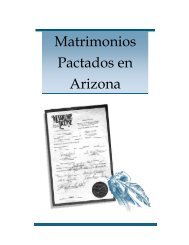1 CA-CV 11-0796 - Arizona Judicial Department
1 CA-CV 11-0796 - Arizona Judicial Department
1 CA-CV 11-0796 - Arizona Judicial Department
Create successful ePaper yourself
Turn your PDF publications into a flip-book with our unique Google optimized e-Paper software.
IN THE COURT OF APPEALS<br />
STATE OF ARIZONA<br />
DIVISION ONE<br />
STATE OF ARIZONA ex rel. THOMAS ) 1 <strong>CA</strong>-<strong>CV</strong> <strong>11</strong>-<strong>0796</strong><br />
C. HORNE, )<br />
) DEPARTMENT D<br />
Plaintiff/Appellee, )<br />
) OPINION<br />
v. )<br />
)<br />
SASKIA ANTHONY; GREGORY GLASS; )<br />
and VANCE EDWARDS, )<br />
)<br />
Claimants/Appellants. )<br />
)<br />
__________________________________)<br />
Appeal from the Superior Court in Maricopa County<br />
Cause No. <strong>CV</strong>2007-009061<br />
The Honorable Linda A. Akers, Judge (Retired)<br />
AFFIRMED<br />
Greenberg Traurig, LLP<br />
by Booker Travis Evans, Jr.<br />
Alexandra Mijares Nash<br />
Attorneys for Claimants/Appellants<br />
Thomas C. Horne, <strong>Arizona</strong> Attorney General<br />
by Aaron S. Ludwig, Assistant Attorney General<br />
Katrin M. Nelson, Assistant Attorney General<br />
Attorneys for Plaintiff/Appellee<br />
Phoenix<br />
Phoenix<br />
K E S S L E R, Judge<br />
1 Claimants/Appellants Saskia Anthony, Gregory Glass,<br />
and Vance Edwards (collectively “Appellants”) appeal from the<br />
superior court’s order directing the forfeiture of three<br />
vehicles.<br />
We affirm based upon the Appellants’ untimely and
deficient answer to the complaint and the evidence supporting<br />
probable cause.<br />
FACTUAL AND PROCEDURAL HISTORY<br />
2 In May 2005, Chandler police officers executed a<br />
search warrant at the Chandler residence of Levin White and his<br />
wife, Kellie Anthony (collectively the “Racketeering<br />
Defendants”).<br />
Along with hundreds of thousands of dollars in<br />
cash, drugs, guns, ammunition and fake drivers’ licenses and<br />
identification cards, the officers seized a black 2001 Mercedes<br />
Benz S600, a white 2000 Jaguar S-Type, and a blue 1996 Chevy<br />
Impala SS (collectively “the Vehicles”).<br />
Registration records<br />
indicated that the Vehicles’ respective owners were Appellants.<br />
White told an officer that he had bought the vehicles legally<br />
and for half of what they were worth. When asked why he held no<br />
property in his name, White responded that he did it “to keep<br />
‘you guys outta my business.’” In May 2007, pursuant to <strong>Arizona</strong><br />
Revised Statutes (“A.R.S.”) sections 13-4307 (2010), -4308<br />
(2010), and -43<strong>11</strong> (2010), the State of <strong>Arizona</strong> (“State”) filed a<br />
Notice of Pending Forfeiture and Notice of Seizure for<br />
Forfeiture against numerous defendants, including the<br />
Racketeering Defendants and Appellants, and seeking forfeiture<br />
of various property, including the Vehicles. 1<br />
In June 2007, the<br />
1 We cite the current version of the applicable statute because<br />
no revisions material to this decision have since occurred.<br />
2
Racketeering Defendants made a filing in that same case entitled<br />
“Claimants Levin White and Kellie Diane Anthony’s Verified<br />
Claim.” Although signed by the Racketeering Defendants’ counsel<br />
and appending affidavits executed by the Appellants, the claim<br />
contained no verification by either of the Racketeering<br />
Defendants. According to that filing, Appellants owned the<br />
Vehicles, the Vehicles were not acquired with funds derived from<br />
illegal activity, neither of the Racketeering Defendants had<br />
provided funds to acquire the Vehicles, and the Vehicles should<br />
be returned to the Racketeering Defendants for safekeeping.<br />
3 On July 19, 2007, the State filed a complaint for an<br />
order of forfeiture against the Racketeering Defendants in<br />
connection with racketeering activity. The complaint named both<br />
the Racketeering Defendants and the Appellants as parties “in<br />
that they have timely filed claims pursuant to A.R.S. § 13-<br />
43<strong>11</strong>.”<br />
4 The complaint seeks in rem racketeering forfeiture<br />
under A.R.S. § 13-2314(G) (2010), and pursuant to the procedures<br />
outlined in A.R.S. §§ 13-4301 through -43<strong>11</strong>.<br />
It alleges that<br />
the Racketeering Defendants participated in or assisted a<br />
criminal syndicate; engaged in money laundering; produced, sold,<br />
or transported drugs; and engaged in various preparatory<br />
offenses. See A.R.S. §§ 13-2308 (2010), -2317 (2010), -3405<br />
(Supp. 2012), -3408 (2010), -1001 through -1004 (2010), -2301(D)<br />
3
act on their behalf, thus, Ms. Anthony files<br />
this Verified Answer. The affidavits of<br />
each are attached hereto as Exhibit A.<br />
The Racketeering Defendants claimed in the superior court that<br />
the amended answer cured any defect.<br />
7 Extensive litigation ensued. Among other things, the<br />
superior court denied the State’s objections and motions to<br />
strike the Racketeering Defendants’ verified answer and claim.<br />
Those rulings contained no determinations as to whether<br />
Appellants were parties.<br />
8 During discovery, Appellants failed to definitively<br />
answer questions about their Vehicles’ purchase dates, the<br />
sellers, and the purchase prices. Various superior court<br />
filings address whether Appellants were parties. In one filing,<br />
the Racketeering Defendants asserted that the Appellants are<br />
“not parties to this action but are merely witnesses who would<br />
testify that they purchased the [V]ehicles with untainted funds<br />
and that they authorized [the Racketeering Defendants] to<br />
possess and control” the Vehicles. Appellants’ counsel<br />
similarly took the position that Appellants were not parties.<br />
9 At a March 3, 2009 status conference, the State cited<br />
A.R.S. § 13-4301(5) and (4) as authority that the Racketeering<br />
Defendants qualified as neither parties nor claimants with<br />
5
espect to the Vehicles. 2<br />
The court agreed with the State that<br />
Appellants were “appropriate parties” to the litigation and<br />
counsel for the Racketeering Defendants told the court that he<br />
would be representing Appellants.<br />
10 The superior court accordingly ordered Appellants to<br />
“file responsive pleadings within the time limits set forth in<br />
the Rules.” Appellants failed to file by the twenty-day<br />
deadline under A.R.S. § 13-43<strong>11</strong>(G), and instead filed motions to<br />
dismiss on April 2, 2009, which the State opposed and the court<br />
denied.<br />
<strong>11</strong> On April 30, 2009, after the State applied for an<br />
order of forfeiture based upon the Appellants’ failure to comply<br />
with the statutory requirements, Appellants filed a verified<br />
answer, although only Glass submitted a concurrent verification.<br />
The State moved to strike the Appellants’ answer based on the<br />
failure to comply with A.R.S. § 13-43<strong>11</strong>(E) and (G), and supplied<br />
a supplemental affidavit containing facts concerning the<br />
Vehicles.<br />
12 The superior court granted the State’s motion to<br />
strike Appellants’ answers, deemed the arrangement with the<br />
2 According to section 13-4301(5), “[a] person who holds property<br />
for the benefit of or as agent or nominee for another is not an<br />
owner.” Thus, an owner is a person who holds a legal or<br />
equitable interest in property. To qualify as an interest<br />
holder, one must be “a person in whose favor there is a security<br />
interest or who is the beneficiary of a perfected encumbrance,<br />
pertaining to an interest in property.” A.R.S. § 13-4301(4).<br />
6
Vehicles a “sham,” and stated that the three Appellants did not<br />
own the Vehicles and did not need to be “cluttering up this<br />
litigation.”<br />
The superior court also made findings regarding<br />
notice, jurisdiction, and facts sufficient to establish probable<br />
cause for forfeiture and granted the forfeiture application. At<br />
a joint status conference, Judge Akers, newly assigned to the<br />
case, ordered the State to supply the proposed form of order.<br />
The State complied, and the superior court signed an <strong>Arizona</strong><br />
Rule of Civil Procedure 54(b) order of forfeiture.<br />
Appellants<br />
timely appealed.<br />
13 We have jurisdiction pursuant to A.R.S. §§ 12-<br />
120.21(A)(1) (2003) and -2101(A)(1) (Supp. 2012).<br />
DISCUSSION<br />
I. The superior court properly struck Appellants’ answer<br />
and granted the State’s application to proceed with<br />
forfeiture based upon Appellants’ failure to comply<br />
with A.R.S. § 13-43<strong>11</strong>(G).<br />
14 To preserve a claim to property seized for forfeiture,<br />
a party must file both a claim and an answer in compliance with<br />
A.R.S. §§ 13-43<strong>11</strong>(D)-(E) and (G), respectively. See A.R.S. §<br />
13-43<strong>11</strong>(E) (requiring a person claiming an interest to file a<br />
verified claim setting forth among other things, the date and<br />
circumstances of the acquisition of the property and the reason<br />
why the property is not subject to forfeiture); A.R.S. § 13-<br />
43<strong>11</strong>(G) (permitting the state to proceed with forfeiture with<br />
7
ten days’ notice to any person who timely filed a claim but did<br />
not file an answer; claimant has twenty days to file an answer<br />
after filing claim); State v. Jackson, 210 Ariz. 466, 471-72, <br />
25-28, <strong>11</strong>3 P.3d <strong>11</strong>2, <strong>11</strong>7-18 (App. 2005) (holding that appellant<br />
had an obligation to file an answer under the statutory scheme<br />
and his failure to do so permitted the state to proceed with<br />
forfeiture); accord State v. $5,500 in U.S. Currency, 169 Ariz.<br />
156, 159, 817 P.2d 960, 963 (App. 1991).<br />
15 Assuming, without deciding, that Appellants properly<br />
filed a claim, we focus our attention on whether<br />
Appellants<br />
complied with the answer requirement once the superior court<br />
determined that they were parties on March 3, 2009. 3<br />
We review<br />
de novo the superior court’s interpretation of the relevant<br />
statutes and court rules. State v. Gutierrez, 229 Ariz. 573,<br />
576, 19, 278 P.3d 1276, 1279 (2012).<br />
16 According to A.R.S. § 13-43<strong>11</strong>(B), the <strong>Arizona</strong> Rules of<br />
Civil Procedure govern forfeiture proceedings unless a statute<br />
provides different procedures. Pursuant to A.R.S. § 13-43<strong>11</strong>(G),<br />
Appellants had twenty days from the March 3, 2009 hearing to<br />
file and serve their answer. Instead, they submitted motions to<br />
dismiss on April 2, 2009. Notwithstanding Appellants’ contrary<br />
arguments, the failure to timely file these motions constituted<br />
3<br />
The State’s complaint acknowledges that it received timely<br />
claims from Appellants.<br />
8
a default and deprived Appellants of an extended time to answer.<br />
See A.R.S. § 13-43<strong>11</strong>(G); accord Ariz. R. Civ. P. 12(a)(1)(A),<br />
(a)(3)(A). 4<br />
17 According to A.R.S. § 13-43<strong>11</strong>(G): “If no proper answer<br />
is timely filed, the attorney for the state shall proceed as<br />
provided in §§ 13-4314 and 13-4315 with ten days’ notice to any<br />
person who has timely filed a claim that has not been stricken<br />
by the court.”<br />
The State applied for an order of forfeiture<br />
based upon the Appellants’ failure to timely respond and, under<br />
these circumstances, the superior court properly granted it.<br />
18 On appeal, Appellants argue that: (1) they are<br />
entitled to a ten-day grace period to file an answer following<br />
the State’s filing of its application for an order of<br />
forfeiture; (2) their prior filings should be construed as<br />
answers; (3) they are entitled to an extension of time based<br />
upon the waiver of service they executed in 2007; and (4) the<br />
State has waived its right to object. We disagree.<br />
4<br />
While certain types of motions to dismiss may qualify as a<br />
responsive pleading under the <strong>Arizona</strong> Rules of Civil Procedure<br />
12(a)(3), 12(b) and 55, the motions still have to be filed<br />
within the time to file an answer. Appellants did not timely<br />
file their motions to dismiss to avoid a default.<br />
9
A. A.R.S. § 13-43<strong>11</strong>(G) does not supply a ten-day<br />
grace period.<br />
19 Appellants contend that, although they failed to file<br />
within the twenty-day period after March 3, 2009, their answer<br />
is timely because a ten-day grace period is provided under<br />
A.R.S. § 13-43<strong>11</strong>(G). Although A.R.S. § 13-4314 may be “the<br />
functional equivalent of a default judgment,” Jackson, 210 Ariz.<br />
at 469, 13, <strong>11</strong>3 P.3d at <strong>11</strong>5, A.R.S. § 13-43<strong>11</strong>(G) provides the<br />
controlling procedures.<br />
Subsection (G) requires the State to<br />
proceed with an application for forfeiture in accordance with<br />
A.R.S. §§ 13-4314 and -4315 with ten days’ notice. The<br />
forfeiture application is filed “with” the notice, not after the<br />
notice is given. A.R.S. § 13-43<strong>11</strong>(G).<br />
20 Nowhere in the statute is there a reference to a grace<br />
period. Jackson states that the failure to timely answer<br />
“triggered the provision that the state ‘shall proceed as<br />
provided in §§ 13-4314 and -4315.’” 210 Ariz. at 471, 22, <strong>11</strong>3<br />
P.3d at <strong>11</strong>7 (quoting A.R.S. § 13–43<strong>11</strong>(G)).<br />
Jackson goes on to<br />
state that “the plain language of § 13-43<strong>11</strong>(G) expressly<br />
provides that §§ 13-4314 and -4315 apply even though a timely<br />
claim has been filed so long as a timely answer has not been<br />
filed.” Id. at 24.<br />
21 Jackson notes that the applicable party in that case<br />
failed “to answer the state’s complaint after receipt of the<br />
10
ten-day letter specified in § 13-43<strong>11</strong>(G),” therefore invoking<br />
the default mechanisms. Id. at 25. To the extent that<br />
Jackson suggests that a filing within the ten-day period would<br />
preserve the answer, we reject that assertion.<br />
22 As the State points out, the ten-day notice period<br />
serves various purposes that have no connection to a grace<br />
period, including notification: (1) of the impending order of<br />
default to which the defendant may take an appeal or file a Rule<br />
60(c) motion; (2) to non-defaulting claimants who wish to appear<br />
and protect their interest in the property; and (3) to injured<br />
claimants who are not required to file answers pursuant to<br />
A.R.S. § 13-43<strong>11</strong>(I), and to claimants whose interests are<br />
undetermined but exempt under A.R.S. § 13-4314(C) so that they<br />
may take appropriate action to protect whatever interests they<br />
might have.<br />
B. The prior filings are not functional equivalents<br />
of answers and the waiver of service does not<br />
assist Appellants.<br />
23 Equally unavailing is Appellants’ argument that the<br />
Racketeering Defendants’ prior filings should be deemed the<br />
functional equivalent of answers, or that their execution of a<br />
waiver of service of summons extended the time to answer by<br />
sixty days. Appellants’ counsel admitted on March 3, 2009, that<br />
Appellants had not filed answers and the record shows no answers<br />
filed by them.<br />
Moreover, to accept Appellants’ argument, we<br />
<strong>11</strong>
would have to ignore the statutory scheme requiring the filing<br />
of an answer after the filing of the complaint.<br />
Consequently,<br />
we reject Appellants’ argument that any prior filings satisfied<br />
the answer requirement.<br />
24 As to the waiver of service, <strong>Arizona</strong> Rule of Civil<br />
Procedure 4.1(c)(3) of the <strong>Arizona</strong> Rules of Civil Procedure<br />
provides that “[a] defendant that, before being served with<br />
process timely returns a waiver is not required to serve an<br />
answer to the complaint until 60 days after the date on which<br />
the request for waiver of service was sent.” Because the waiver<br />
of service occurred in 2007 and the additional sixty-day period<br />
had already expired by March 2009, the rule is of no use to<br />
Appellants. Appellants cannot successfully claim another<br />
extension beyond 2007.<br />
C. The State preserved its right to challenge the<br />
answer.<br />
25 Appellants argue the State waived the right to<br />
challenge their answer. We disagree.<br />
This is not a case akin<br />
to State ex rel. Horne v. Campos, 226 Ariz. 424, 430, 24, 250<br />
P.3d 201, 207 (App. 20<strong>11</strong>), in which the court found that, after<br />
waiting three years to object to the party’s failure to file a<br />
claim, the State had waived its right to raise the issue. Here,<br />
the State has consistently maintained that the Racketeering<br />
12
Defendants could not litigate Appellants’ ownership claims for<br />
them. Campos does not apply.<br />
II.<br />
Probable cause supported the entry of the forfeiture<br />
order.<br />
A. The detectives’ evidence satisfied the State’s<br />
burden of proof.<br />
26 Appellants additionally challenge the superior court’s<br />
probable cause determination. Before granting a forfeiture<br />
application, the superior court must make determinations<br />
concerning notice, jurisdiction, and facts sufficient to<br />
establish probable cause for forfeiture.<br />
A.R.S. § 13-4314(A).<br />
We review the probable cause determinations in forfeiture<br />
actions de novo. In re U.S. Currency in the Amount of<br />
$315,900.00, 183 Ariz. 208, 2<strong>11</strong>, 902 P.2d 351, 354 (App. 1995).<br />
We will not disturb the superior court’s factual findings unless<br />
they are clearly erroneous. Id.<br />
27 To obtain forfeiture of property based on drug-related<br />
racketeering, the State must show probable cause to believe the<br />
property is a proceed of or facilitated a drug sale based on all<br />
the evidence at the time of the forfeiture hearing.<br />
In re<br />
$24,000 in U.S. Currency, 217 Ariz. 199, 200, 9-10, 171 P.3d<br />
1240, 1243 (App. 2007). To meet that burden, the State must<br />
show reasonable grounds for its belief “supported by more than a<br />
mere suspicion, but less than prima facie proof.” Id. at <strong>11</strong><br />
(citation and internal quotation marks deleted). This requires<br />
13
some credible evidence supporting the allegation. Id. at 13<br />
(citation and internal quotation marks omitted). Notwithstanding<br />
Appellants’ claims, the State was not also required to prove in<br />
this in rem proceeding that Appellants engaged in wrongdoing or<br />
that White had been convicted of a racketeering offense.<br />
28 White’s statements during the search indicated that he<br />
had purchased the Vehicles but had no property in his name “to<br />
keep ‘you guys outta my business.’” Affidavits from two police<br />
detectives further supported probable cause to believe that the<br />
Racketeering Defendants engaged in such racketeering conduct as<br />
the sale of prohibited drugs and money laundering under A.R.S. §<br />
13-2301(D)(4)(b)(xi), (xxvi), and the Vehicles were forfeitable<br />
because they had been acquired and maintained with racketeering<br />
proceeds under A.R.S. § 13-2314(G)(1) and/or as substitute<br />
assets for assets which are subject to, but no longer available<br />
for, forfeiture under A.R.S. § 13-4313(A).<br />
29 One detective’s affidavit recounts the evidence that<br />
White had not reported<br />
wage income in <strong>Arizona</strong> or California<br />
between 1998 and 2005. Kellie Anthony likewise had reported no<br />
income in 2003, and then earned $14,683 in 2004 and $39,742.01<br />
in 2005.<br />
30 White claimed to earn money from investments with<br />
Primex Technology, and Kellie Anthony claimed earnings of<br />
$681,797.50 in real estate transactions. As the detective’s<br />
14
affidavit points out, the Racketeering Defendants’ assets,<br />
expenditures, and expenses exceeded their documented income by<br />
more than one hundred thousand dollars.<br />
31 Another detective supplied an affidavit focusing on<br />
the Vehicles’ relationship to the case. We review the evidence<br />
for each vehicle.<br />
1. 2000 Jaguar-S Type<br />
32 According to one detective, police had stopped this<br />
vehicle in Inglewood, California during 2002 when it was driven<br />
by then-narcotics fugitive Trent Woodmore.<br />
At that time, the<br />
vehicle was registered to Sabrina Anthony. Sabrina Anthony told<br />
police that White, her brother-in-law, had asked to have the<br />
vehicle registered in her name, but that she was not the owner<br />
and had never driven it. Trent Woodmore told police that White<br />
had loaned him the car while Woodmore was on the run.<br />
33 The record also indicates that Sabrina Anthony<br />
contacted White after the interview, and California <strong>Department</strong><br />
of Motor Vehicles records reflect that she subsequently<br />
transferred the Jaguar to Glass, who had served a five-year<br />
sentence for possession of marijuana for sale.<br />
Meanwhile, a<br />
check of records maintained by an auto dealer for 2003 lists the<br />
Jaguar’s owners as Kellie Anthony and “Mark Smith,” an alias<br />
used by White.<br />
In responding to the State’s interrogatories,<br />
however, Glass states that he has been the sole title holder<br />
15
since the vehicle’s purchase and pays for the repairs, although<br />
he could not say where he purchased the vehicle or from whom.<br />
2. 2001 Mercedes Benz S600<br />
34 This car is registered to Edwards, who claims that he<br />
stores it with the Racketeering Defendants.<br />
Edwards also has<br />
stated that he rebuilt the vehicle as a salvage car intending<br />
for White to sell it, but no salvage license is of record.<br />
Edwards claims to insure the vehicle, but supplied no proof of a<br />
policy.<br />
35 Although Edwards told the State that no work had been<br />
done on the car, 2004 records from an auto dealer indicate that<br />
the Racketeering Defendants had brought the Mercedes in for<br />
thousands of dollars in repairs and maintenance.<br />
They both<br />
represented that they were its owners.<br />
3. 1996 Chevrolet Impala SS<br />
36 Saskia Anthony’s affidavit states that she chooses to<br />
lodge this car with the Racketeering Defendants because she<br />
lives in a multi-unit complex. According to Saskia Anthony, she<br />
bought the Impala from White, but does not recall what she paid<br />
for it or when.<br />
Saskia Anthony also stated that she did not<br />
know how much she pays for the Impala’s registration and<br />
insurance.<br />
37 Saskia Anthony’s claim that there were no significant<br />
repair issues with the vehicle is belied by service records.<br />
16
White paid $<strong>11</strong>37 to have the transmission rebuilt in April 2005<br />
and paid for other servicing and welding in 2001 and 2004.<br />
Moreover, White drove the Impala to meet with a person at a<br />
point when wiretap records indicate the pair were negotiating a<br />
narcotics deal.<br />
38 Appellants Glass and Edwards responded with additional<br />
evidence, none of it verified.<br />
It included the title document<br />
to the Jaguar.<br />
Edwards provided an automobile insurance policy<br />
purporting to show that he was paying for the Mercedes Benz<br />
titled in his name, although the State contends that the vehicle<br />
identification numbers did not match and the insurance company<br />
was not the one he had previously identified.<br />
39 Under the totality of the circumstances, the evidence<br />
was sufficient for the superior court to find the probability<br />
that: (1) the Racketeering Defendants engaged in racketeering<br />
conduct, involving the prohibited sale of drugs and money<br />
laundering, under A.R.S. § 13-2301(D)(4)(b)(xi), (xxvi); and (2)<br />
the Vehicles were forfeitable as having been maintained with the<br />
proceeds of racketeering conduct under A.R.S. § 13-2314(G)(1),<br />
and/or as substitute assets for assets subject to forfeiture<br />
17
that are no longer available for forfeiture under A.R.S. § 13-<br />
4313(A). 5<br />
III. The superior court’s decisions to strike Appellants’<br />
answer and label their vehicle arrangement a “sham”<br />
did not deprive Appellants of due process.<br />
40 Appellants also challenge the superior court’s<br />
decision to strike their answer and refer to their position as a<br />
“sham,” and to find that Appellants did not own the Vehicles<br />
without providing an evidentiary hearing.<br />
Appellants contend<br />
that the court consequently deprived them of due process.<br />
41 By prior order, Appellants’ counsel received notice<br />
that all motions would be considered at the hearing.<br />
At that<br />
time, the State’s motion to strike Appellants’ answer and<br />
application for the order of forfeiture were pending.<br />
42 In any proceeding under the forfeiture statutes, each<br />
Appellant has the burden to establish, by the preponderance of<br />
the evidence, that he or she was the owner or an interest holder<br />
5 Appellants argue that, when the case was transferred from one<br />
judge to another, the second judge (who entered the forfeiture<br />
order) acted without first reviewing the record. Because<br />
Appellants fail to cite record evidence for this contention, we<br />
reject it. See AR<strong>CA</strong>P 13(a)(6) (an argument shall contain<br />
citations to the parts of the record relied upon); Prairie State<br />
Bank v. I.R.S., 155 Ariz. 219, 221 n.1A, 745 P.2d 966, 968 n.1A<br />
(App. 1987) (declining to consider assertions unsupported by<br />
record evidence). Furthermore, because Appellants have failed<br />
to supply a transcript of that hearing, we assume that the<br />
record supports the superior court’s actions. See AR<strong>CA</strong>P<br />
<strong>11</strong>(b)(1) (imposing the burden on the appellant to supply<br />
relevant transcripts); Johnson v. Elson, 192 Ariz. 486, 489, <br />
<strong>11</strong>, 967 P.2d 1022, 1025 (App. 1998) (presuming that the<br />
unproduced transcripts support the superior court’s ruling).<br />
18
“before other evidence is taken.” A.R.S. § 13-4310(D) (emphasis<br />
added).<br />
To meet this burden, each Appellant was required to<br />
provide sworn facts that support ownership or an interest in the<br />
property in the claim and answer. A.R.S. § 13-43<strong>11</strong>(D)-(G).<br />
43 Despite multiple opportunities, Appellants provided no<br />
specific supporting facts required by A.R.S. § 13-43<strong>11</strong>(E)(4),<br />
(6), (7), including the date when they acquired an interest in<br />
the Vehicles, the transferors, and the circumstances under which<br />
they acquired their interests. Only one Appellant even<br />
submitted a contemporaneous verification.<br />
By the time of the<br />
superior court’s decision, more than two and one-half years had<br />
passed since the Racketeering Defendants had appended<br />
Appellants’ affidavits to their claim. In light of this record,<br />
and the Appellants’ failure to meet the burden under A.R.S. §<br />
13-4310(D), the superior court did not abuse its discretion by<br />
striking the answers as a “sham,” declining to proceed with an<br />
evidentiary hearing, and the court did not deprive Appellants of<br />
due process in doing so. 6<br />
6 Appellants also complain about the denial of leave to amend. A<br />
court has the discretion to allow an owner or interest holder to<br />
amend a claim to correct technical inadequacies. In re<br />
$70,269.91 in U.S. Currency, 172 Ariz. 15, 20-21, 833 P.2d 32,<br />
37-38 (App. 1991) (citing relevant factors for allowing<br />
amendment). Here, repeated failures to comply with the<br />
statutory requirements support the court’s denial of Appellants’<br />
request for leave to amend.<br />
19
CONCLUSION<br />
44 For the foregoing reasons, we affirm the superior<br />
court’s rulings in all respects.<br />
CONCURRING:<br />
/S/<br />
DONN KESSLER, Judge<br />
/S/<br />
JOHN C. GEMMILL, Presiding Judge<br />
/S/<br />
JON W. THOMPSON, Judge<br />
20


